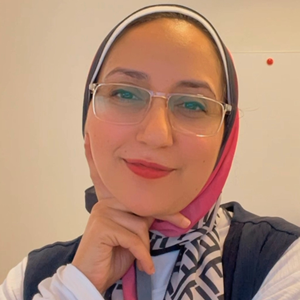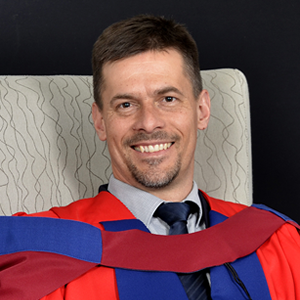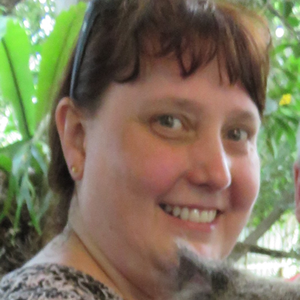
Prof. Daryl Balia, Deputy Vice-Chancellor: Information Technology and Potchefstroom Campus Operations
Prof Daryl Balia, former executive dean of the NWU's Faculty of Theology, was appointed Deputy Vice-Chancellor: Information Technology and Potchefstroom Campus Operations in 2019 for a fixed term of five years. Prof Balia, a seasoned church historian, was appointed executive dean at the NWU in 2018. His illustrious career includes, among others, working as dean of the Faculty of Theology at the University of Durban-Westville (where he started the Centre for Constructive Theology), international director at the University of Edinburgh and director of institutional planning, transformation and quality assurance of the Central University of Technology in the Free State. He also served as division head for governance at the Institute for Security Studies in Cape Town, general secretary for the International Association for Religious Freedom in the United Kingdom and chief director for the Public Service Commission. Prof Balia has extensive experience in project management, which includes being at the centre of organising national and international events. He has published several books and reports and has contributed to numerous articles and book chapters in other publications. He gained extensive experience working with academics, teachers, researchers, and students while developing and maintaining global networks for research, and teaching students (including providing Master's degree supervision), combined with periods of work and study in Germany, France, the United States, England, Scotland and South Africa. Working cross-culturally has been integral to all his positions over the past two decades. He also shares wide-ranging experiences of interacting with the scientific community on all the world's continents. His most critical strength is 'to inspire and unite staff and students in educational settings and other contexts, coupled with his global connections, government and civil society work experiences, and his personal and professional standing in the academy of learning. To lead in digital business and information technology innovation is one of his key goals for the NWU to set as a goal for itself. The critical matter of doing the unitary structure work in actual practice across all our campuses in line with the national imperatives of social cohesion and diversity planning is paramount in my position as DVC Information Technology and Potchefstroom Campus Operations.
Title: Welcome address

Dr. Edmund Balnaves: IFLA Divisional Chair
Dr. Edmund Balnaves the CEO of Prosentient Systems (Australia) and an active technologist in the library field. He is the Chair of the Information Technology (IFLA) Section in the International Federation of Library Associations, and is an incoming Divisional Chair of IFLA. He is actively engaged in the software development of open-source systems, AI and discovery for libraries. His doctoral research was in the area of systematic content reuse and metadata. His business provides hosted open-source library services, AI-enabled discovery and multi-network library resource sharing systems. His Inter-Search™ hosted services are used by over 500 libraries in Australia and the Asia Pacific region.
Title: AI on the move: From the Skynet to ChatGPT.
Abstract: This presentation explores Artificial Intelligence services relevant to libraries, including the role of Artificial Intelligence in library service delivery. The presentation provides an overview in the different ways AI can be applied in the library context, including machine learning, GPT enhanced chat, integration with building services and facilities, fully automated services and Robotic-based service delivery. ChatGPT is only one dimension of Artificial Intelligence, and the tool kits for AI are accessible and allow libraries of many types to explore the new technologies.

Prof. Arthur G.O. Mutambara: Director of the Institute for Future Knowledge (IFK), University of Johannesburg
Professor Arthur G.O. Mutambara is the Director and Full Professor of the Institute for the Future of Knowledge (IFK) at the University of Johannesburg (UJ) in South Africa. He is a world-renowned roboticist, academic, author, Pan-Africanist and technology strategist. Professor Mutambara is also the Director of IFK’s Decentralised Artificial Intelligence and Control Systems (DAICS) Research Group and drives the African Agency in Public Health (AAPH) initiative within the Future of Health (FoH) Research Group. He teaches Control Systems in UJ’s Mechanical Engineering and Electrical and Electronic Engineering Departments. He has taught Controls Systems at MIT Aeronautics Astronautics Department (Course 16) and FAMU-FSU College of Engineering, both in the United States.
Professor Mutambara is the Former Deputy Prime Minister of Zimbabwe. Mutambara was one of the three Principals who created and led the Government of National Unity (GNU) from 2009 to 2013. The other two were the late former Prime Minister Morgan Tsvangirai and the late former President Robert Mugabe. As the Deputy Prime Minister, his key functions included assisting the Prime Minister in policy formulation by the Cabinet and supervision of policy implementation by the Council of Ministers. He also specifically supervised the Ministries under the Infrastructure Cluster, such as Energy and Power Development, Transport and Infrastructure, Information Communication Technologies, Water Resources and Development, and Public Works. Professor Mutambara coordinated regional policy formulation within these sectors across SADC and COMESA. Furthermore, DPM Mutambara was in charge of driving three critical national efforts of the GNU: the development of a Shared National Vision, the Rebranding of Zimbabwe and the formulation of a National Infrastructure Master Plan.
Professor Mutambara is a distinguished public intellectual across the African continent and globally, where he has conducted presentations on leadership, management, business and engineering, in addition to motivational speeches and seminars. In the United States, Mutambara was a Research Scientist at the National Aeronautics and Space Administration (NASA), Visiting Professor at the Massachusetts Institute of Technology (MIT), a Visiting Research Professor at the Carnegie Mellon University’s Robotics Institute, and a Professor at the Florida Agricultural and Mechanical University – Florida State University (FAMU-FSU) College of Engineering. In his academic research and teaching, he has received outstanding reviews and praise from students and peers worldwide. Professor Mutambara was also a Management Consultant with McKinsey & Company in Chicago and the Director of Electronic Payments at Standard Bank in South Africa.
He is a Chartered Engineer, a Fellow of the Institution of Engineering and Technology (IET), a Professional Engineer, a Fellow of the Zimbabwe Institution of Engineers (ZIE), a Fellow of the Zimbabwe Academy of Sciences (ZAS), and a Senior Member of the Institute of Electrical and Electronics Engineers (IEEE). In addition to the three volumes on Thought Leadership, Mutambara has written two electrical engineering books widely used in engineering graduate schools in the United States, Europe, China, Japan and Africa: Decentralized Estimation and Control for Multisensor Systems (1998), and Design and Analysis of Control Systems (1999). Prof. Mutambara holds a PhD in Robotics and Mechatronics, and an MSc in Computer Engineering, both from the University of Oxford. He was there as a Rhodes Scholar from September 1991 to March 1995. He graduated with a BSc (Honours) in Electrical Engineering from the University of Zimbabwe in 1990. In 2007, Mutambara was accorded the World Economic Forum (WEF) Young Global Leader status and subsequently attended WEF events from 2007 to 2013 in Davos (Switzerland), China, India and Africa.
Title: The Great Expectations and Daunting Risks of Artificial Intelligence.

Ms. Iman Magdy Khamis: MLIS, MSDS, Library Director, Northwestern University Qatar
Northwestern University Qatar library director and a data scientist recently graduated from Northwestern University. Iman has been working in libraries since 2005, where she started her career in Bibliotheca Alexandrina before moving to Northwestern University Qatar. Iman's research interests are Machine Learning and Artificial Intelligence in Libraries. She is the author of two chapters in the recently published Handbook of Research on Advancements of Contactless Technology and Service Innovation in Library and Information Science. The chapters' titles are Chatbot for Libraries and Book Recommender System. In these two chapters, Iman explained in detail the concepts used by data scientists to build chatbots and Book Recommender Systems.
Title: Generative AI and Libraries: Challenges and Opportunities.
Abstract: With the rise of generative artificial intelligence (AI), everyone is trying to imagine the future of most professions with incredible technological advances. Machine learning and Artificial intelligence have transformed library services drastically in the past few years. We have seen most Public and Academic libraries embracing AI in their daily service in a manner that enhanced the user experience overall. The question that is rising now is whether Generative AI such as ChatGPT and similar software will improve library services and librarianship or will it be the enemy of our profession. We can explain Generative AI as a tool that allows computers to process vast amounts of data and make accurate predictions in a form that is understandable to humans. Open AI.s ChatGPT-3 is a language model trained on extensive data since June 2021. When ChatGPT-4 was released, it required a subscription for this research, so we chose to use ChatGPT-3. This exploratory study will determine whether libraries should be concerned with their future in the presence of generative AI technologies. We will do that by evaluating ChatGPT-3 potential to predict the future of libraries and libraries services. In this research, we analysed ChatGPT-3 predicted future scenarios by examining the prediction consistency and evaluating the results based on criteria. According to the results, ChatGPT-3 was able to accurately predict different scenarios for the library's future, enabling the researchers to identify areas that will require development soon. However, it is essential to mention that ChatGPT-3 predictive power was constrained, and the predicted scenarios may be improved. Noting that the researcher looked for qualifiable indicators to examine the probability of predicted scenarios being true. In conclusion, the investigation showed that ChatGPT-3 has excellent power for altering the library's future in a better direction.

Ms. Susan Veldsman: Director of the Scholarly Publication Unit, Academy of Sciences in South Africa
Susan Veldsman is Director of the Scholarly Publication Unit at the Academy of Sciences in South Africa, responsible for driving the Open Science agenda, raising the visibility, discoverability and accessibility of South African scholarly journals, improving the quality of SA research output, and supporting the development of policy frameworks to facilitate optimal use and access to publicly funded research. She received the Electronic Publishing Trust (EPT) award for her outstanding contribution to promoting Open Access in Developing Countries. She was recently the Co-chair of the IAP Report on "Combating Predatory Journals and Conferences", launched on the 16th of March 2022.
Title: Artificial intelligence and associated tools and policies in editorial decision making.
Abstract: Researchers began experimenting with ChatGPT when it was released in November 2022, looking at ways how they could benefit and how it could support writing systematic reviews, literature searches, summarising academic articles etc., which many publishers wanted to reject before the trend gained traction. Some publishers quickly updated their respective editorial and publishing policies, stating unconditionally that ChatGPT can't be listed as an author on an academic paper. There were also those publishers who addressed this 'grey area' differently regarding whether ChatGPT can be used for assistance in the research process through the level of detail and clarity of their policies. One notable exception is ACS, which is taking a proactive approach to defining guidelines on the proper use of AI technologies. An ACS Energy 'Viewpoint' piece considers the possibility that ChatGPT could implement an 'assisted-driving approach promising to free researchers' time from the burden of scientific writing and free up their time for other research and science activities. An editorial in ACS Nano outlines detailed best practices and policies for using AI tools. Another issue is whether traditional plagiarism checkers have caught up to AI detection, and can those tools be fooled in some way or another? The presentation is aimed at discussing and gaining clarity on these various issues.

Dr. Kirstin Krauss: Manager for Iontaofa Intelligence
Kirstin Krauss is a Business Development Manager for Iontaofa Intelligence, a company that promotes quality scholarly communications. He is also a part-time Research Advisor of Worldwide Information Services (WWIS) and a visiting researcher for STADIO Higher Education. In prior roles, he served as an academic and Professor at several academic institutions in South Africa, including CPUT, UKZN, UP, Rhodes, and UNISA. Kirstin's research focuses mainly on postgraduate student development, supervision capacity building, ICT for Development, Critical Ethnography, and mitigating questionable scholarly practices.
Title: Disciplinary knowledge and comparative prompting strategy analysis: How an academic librarian and a researcher approached topic discovery and keywords identification using AI as a tool.
Abstract: Academic librarians and researchers are critical partners in the typical topic discovery process, as they identify relevant literature, develop search strategies, organorganiserature, and build bibliographies. From a librarian's perspective, it is about employing practical information retrieval skills to support the researcher. On the other hand, researchers are interested in developing a conceptual basis, namely a literature review, that can inform various methodological choices. These choices range from identifying knowledge gaps and relevant literature on the topic to finding literature on appropriate methodologies and theories. Consequently, librarians should possess a deep understanding of the researcher's needs to effectively assist them during the topic discovery phase. Usually, the process starts with a researcher approaching the librarian with a broad topic of interest. The librarian then guides the researcher in identifying relevant databases, keywords, and literature search strategies. Additionally, the librarian helps produce a bibliography that researchers can further develop throughout the research process. On the other hand, the researcher typically filters through the references to identify key papers that could inform critical aspects of the research. Topic and literature discovery is a partnership between an academic librarian and a researcher. Therefore, both specialists should have an intricate understanding of what topic discovery entails.
Title: Can I use ChatGPT to generate a fully AI-authored thesis? Reflecting on prompting strategies, useful detection tools.
Abstract: In this paper, an academic librarian and a researcher reflect on how their respective disciplinary backgrounds informed their approaches to topic discovery, specifically utilising AI as an assistive tool. Following the typical process, the researcher proposed a broad research topic. Both individuals then independently experimented with prompting strategies using AI and additional information sources to identify the most relevant bibliography and refine the topic statement. All prompting scripts and other methods were recorded and subsequently compared. The authors conclude by providing guidance on the value of AI and offering recommendations for effective collaboration during the topic discovery process.

Dr. Mashilo Modiba: Senior Lecturer, Department of Information, UNISA
Dr Mashilo Modiba is a senior lecturer at the Department of Information at UNISA. His research interests include adopting and applying AI, robotic machines, cobots, IoT, big data, and cloud computing in the LIS, including archives and records management. Another research interest is in the development of intelligent libraries in South Africa.
Title: Application of artificial intelligence for the management of library and information services in the Fifth Industrial Revolution.
Abstract: Though artificial intelligence (AI) played a significant role in the fourth industrial revolution (4IR), it is also more prevalent in the fifth industrial revolution (5IR). The 5IR refers to the collaboration between AI and human intelligence (HI). 5IR encompasses a harmonious human-machine union, explicitly focusing on the well-being of stakeholders such as library users, cybrarians and intelligent libraries. This balanced acceptance of human–machine collaborations distinguish the 5IR from the 4IR, which focuses on achieving efficiencies using technology AI has been defined as an area of computer science that emphasises the erection of intelligent machinery that functions and responds like HI. AI performs library and information services (LIS) that cybrarians can perform in libraries. AI is a margin of computer science that focuses on constructing intelligent machinery like HI. This study aims to investigate the application of AI for managing the LIS in the 5IR in South Africa. This is a qualitative study where data will be collected through content analysis. Content analysis related to “artificial intelligence”, “fifth industrial revolution”, and “information and library services” will be reviewed. Data will be analysed and interpreted thematically to ensure that all relevant themes are covered in this study. The preliminary findings reveal that applying AI, such as robotic machines and cobots, helps libraries manage their LIS effectively and efficiently. LIS can be provided faster and quicker regardless of time and distance; such services will be provided remotely. The study recommends that AI be adopted and applied to render and manage the LIS adequately and even to remote users through AI-aided software and applications. A framework will be developed on how AI can control the LIS in the 5IR.
Title: Cloud computing technology for the management of library services in the Fifth Industrial Revolution.
Abstract: Cloud computing technology is a data storage technology model for information technology services that many organisations and individuals are adopting in the fifth industrial revolution, including the library and information sector. Cloud computing can transform how systems are built and services delivered, allowing libraries to extend their impact in the digital revolution. It is internet-based computing where virtual shared servers provide software, infrastructure, platform devices and other resources and hosting to customers on a pay-as-you-use basis. Users can access these services on the “internet cloud” without knowing how to manage the resources. It gives users access to storage, files, software, and servers through their internet-connected devices: computers, smartphones, tablets, and wearables. The purpose was to investigate the application of cloud computing technology for managing library services in the 5IR. This study is a qualitative approach that deployed content analysis as a research methodology. We used themes such as cloud computing technology, library services and the fifth industrial revolution to search for literature. The literature of this study was searched through scholarly databases such as google scholar and research gates. The study reveals that cloud computing can store library data and information in cloud storage facilities. Cloud computing technology can be embedded into library management systems, protecting user information against unauthorised access. This study recommends a framework that can be used to adopt and apply cloud computing technology to manage the quality of library services in the 5IR.
Title: Internet of things for the management and provision of library services in the Fifth Industrial Revolution.
Abstract: The Internet of Things refers to systems of interrelated smart computing devices. These mechanical and intelligent digital machines are provided with unique identifiers, perform different activities in libraries, and can transfer data from networks without human-to-human or human-to-computer interaction. It is the interconnection via the internet of computing devices embedded in everyday objects, enabling them to send and receive data from each other. It is a network of physical objects or things embedded with electronics, intelligent software, sensors, and network connectivity, enabling objects to collect and exchange data in the library. The Internet of Things has the potential to manage and provide quality library services effectively and efficiently in the fifth industrial revolution (5IR). 5IR refers to the collaboration between artificial intelligence and human intelligence in managing and providing quality library services through intelligent sensors, radio frequency and identification devices and artificial intelligence-embedded software and applications. This study investigates the application of the Internet of Things to manage and provide quality library services in the 5IR. This is a qualitative study that deployed content analysis as a research methodology. Themes such as the Internet of Things, library services, radio frequency identification devices and the fifth industrial revolution were used to search for the literature in databases such as google scholar, research gate and other scholarly databases. Preliminary findings of this study reveal that the Internet of Things can be used to trace information resources quicker and faster in the library through smart library apps and radio frequency identification devices. The study further reveals that information resources can be protected through embedded 3D security gates with intelligent sensors and trackers. The study recommends a framework that can be used to adopt the Internet of Things to provide and manage the quality library services in the 5IR.

Prof Lorette Jacobs: Chair of the Department of Information Science, UNISA
Prof Lorette Jacobs is the Department of Information Science Chair at UNISA. Her interests range from records management to using ICTs in information practices, information literacy development, curriculum development and improving teaching and learning practices in higher education. Her current research relates to transcending research paradigms to encompass an Afro-centric paradigmatic construct and exploring supervision models unique to the open-distance e-learning environment. She is involved in an international InterPARES AI-Trust project on using AI in archives.
Title: Artificial Intelligence use in academic libraries: Possibilities of digital twinning.
Abstract: The potential of digital technology like digital twins within the context of artificial intelligence (AI) may be used to facilitate information retrieval, sharing of contents and environments to encourage engagement. However, the utilisation of digital twinning to bring about digital transformation in universities and academic libraries still needs to be utilised. By considering these technologies, universities can enhance teaching practices and research capabilities and contribute to societal development. Digital twins, virtual replicas or models of physical systems or processes, provide universities with the means to simulate, evaluate, and optimise infrastructures, resources, and operations. Universities can gain insights into space utilisation, resource allocation, and facility management by creating digital twins of campus facilities, classrooms, libraries and laboratories. Additionally, digital twins can replicate complex research studies and support group learning, giving students immersive and engaging experiences. Artificial intelligence-powered recommendation systems can tailor or modify informative content searches, academic publications, and other information resources based on specific research interests and knowledge preferences. This may enable students, researchers, and faculty members to access relevant and curated content, enhancing the quality and efficiency of their work. Applying an interpretivism paradigm, the bricolage design was used to extract diverse and non-traditional sources towards foresight suggestions on how digital twinning can be used in futuristic academic libraries. Through foresight methods, the research aims to identify emerging trends as drivers of change that could impact future academic library functions. Bricolage and foresight methods provide a comprehensive understanding of the future of functions and services academic libraries offer to utilise digital twins; it is envisaged that academic libraries can enhance their societal impact, sustainability, and service delivery. Digital twin technology allows academic libraries to enable real-time monitoring, process analysis, and simulation, providing insights into information resource utilisation, patron preferences, and space optimisation.

Mr. Andile Swartbooi: Digital Strategy Officer, North-West University
Andile Swartbooi is an industry veteran with more than 25 years of experience; he currently holds the position of Digital Strategy Officer at North-West University, responsible for NWU's end-to-end Digital Transformation programme. He has extensive experience in the Higher Education ICT sector. He was a Computer Science lecturer much earlier in his career and later held ICT Executive positions at the University of the Witwatersrand and the University of Johannesburg. He also served as Chair of the South African Universities ICT Directors Forum (SAUDIT). Until recently, he has worked for the Sanlam Group, the biggest insurer in Africa, holding various portfolios, including Executive Head for IT Risk & Governance, Chief Information Officer for Sanlam Personal Finance, Head of Software Development, and Head of IT Service Delivery.
Swartbooi holds a BSc (Computer Science) and MPhil (Information & Knowledge Management); he has also completed the Global Executive Development Programme with the Gordon Institute of Business Sciences.
Title: Harnessing Artificial Intelligence to Advance Digital Transformation in Higher Education.
Abstract: With institutions of higher learning faced with increased competition both from within and outside the sector, many are adopting Digital Transformation (Dx) to gain competitive advantage, enhance operational efficiency, and deliver exceptional experiences to their faculty, student, and administration stakeholders. Artificial Intelligence (AI) promises to be a game changer and a key enabler of Digital Transformation. AI-enabled technologies allow institutions to automate business processes, personalise stakeholder engagements and analyse large quantities of data to assist executives in making timely and informed decisions. The Digital Transformation journey, however, entails more than just the plugging in of new technologies; it involves a series of deep and coordinated culture, workforce, and technology shifts that enable new educational and operating models and transform an institution's operations, strategic directions, and value proposition (Educause, 2020). Using North-West University's Digital Business Strategy (DBS) as a case study, the presentation highlights how technology renewal forms part of an institution's overall Digital Transformation journey and how Artificial Intelligence (AI) enabled technologies can be utilised to fast-track the achievement of strategic business goals. Reference is also made to the people factor, ensuring that the rollout of AI technologies is accompanied by a comprehensive change management programme that seeks to leverage the combined strengths of all institutional resources.
